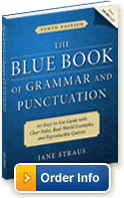|
Welcome to your GrammarBook.com E-Newsletter.

|
“Thank you for polishing my grammar every day”
—Olivia O.
“I open and devour your E-Newsletters much in the same way some might devour the latest issue of People magazine.”
—Sabrina P.
“Your book helps demystify the rules of punctuation which are so essential for effective written communication.”
—Helen M.
|
|
|
We the People, or…?
For much of the last two months, we have been analyzing why the subject pronouns I, he, she, we, they and the
object pronouns me, him, her, us, them are chronically misused and confused.
In this final installment, we’ll deal with flawed sentences like Politicians should respect we the people and It’s a happy outcome for he who laughs last.
Formal writing requires “us the people” (object of respect) and “him who laughs last” (object
of for), even though we instinctively resist tampering with venerable expressions like we the people and he who laughs last.
If being correct would ruin the mood, there may be creative ways around the grammatical buzzkill. In the first case, we could probably avoid censure by
using capitals: Politicians should respect We the People. This signals the reader that the well-known phrase is sacrosanct and must not be
altered.
In the second example, we could write: It's a happy outcome for “he who laughs last.” The quotation marks grant the words special
dispensation, like the title of a book or movie.
So now, here is a summary of the chief causes of pronoun confusion.
- All forms of the verb to be. Informal sentences (It was me, It must have been them, It seems to be her) wrongly use object pronouns instead of what are called subject complements.
(The correct pronouns respectively would be I, they, and she.)
- Compound subjects and compound objects. In everyday speech, when and or or links a pronoun with other nouns or pronouns, the
results are often ungrammatical: Joe and him went fishing, Sue invited my friend and I for dinner, Her or I will meet you there.
(The correct pronouns respectively would be he, me, and she.)
- Comparative sentences using as or than. Sentences like You’re as smart as her and Eddie ran faster than them sound fine but are technically flawed. (The correct pronouns respectively would be she and they.)
- Infinitives and verbs ending in -ing. They change subjects to objects. An infinitive such as to be turns I believe he is honest into I believe him to be honest. A verb ending in -ing, such as going, gives us the option of saying either I saw he was going home or I saw him going home.
This can be especially confusing with compound subjects and objects, or when who-whom is involved.
- Idiomatic phrases containing subject pronouns (we the people, he who laughs last).
Due to the E-Newsletter's large readership, please submit your English usage questions through GrammarBook.com's “Grammar Blog.” |
|
Pop Quiz
Correct any sentences that are formally ungrammatical.
1. LaTroy knew it was him who everyone preferred.
2. According to witnesses, it had to have been we.
3. The receipts were always safe with Maria and I.
4. May him and his friend join us for a nightcap?
5. She’s every bit as confused as me.
6. Your cousin’s wife looks older than he.
7. Who do you suspect was hiding something?
8. Who do you suspect to be hiding something?
9. This has been a bad week for we citizens of the United States.
10. Let he who is without sin cast the first stone.
Free BONUS Quiz For You!
[[firstname]], because you are a subscriber to the newsletter, you get access to one of the Subscription Members-Only Quizzes. Click here to take a Capitalization Quiz and get your scores and explanations instantly!

“So convenient...hundreds of quizzes in one click.”
[[firstname]], Subscribe to receive hundreds of English usage quizzes not found anywhere else!
- Take the quizzes online or download and copy them.
- Get scored instantly.
- Find explanations for every quiz answer.
- Reproduce the quizzes to your heart's content.
- EASY to use.
- No software to download.
- No setup time.
- A real person to help you if you have any questions!
“Fun to test my skills!” “The explanations really help...thanks!”
Your choice: Subscribe at the $29.95 or $99.95 level ($30 off - regularly $129.95).
“I download the quizzes for my students who don't have computer access.”
Subscribe today to receive hundreds of English usage quizzes not found anywhere else!
“Makes learning English FUN!”
 |
Don't need all the quizzes at once?
You can now purchase the same quizzes individually for ONLY 99¢ each. Purchase yours here. |

Get Yours Today!
Get Amazon’s #1 Bestseller in Four Categories!
#1 in Grammar
#1 in Reading
#1 in Lesson Planning
#1 in Vocabulary |
The Blue Book of Grammar
and Punctuation by Jane Straus
An indispensable tool for busy professionals, teachers, students, homeschool families, editors, writers, and proofreaders.
Now available in print AND as an e-Book! Over 2000 copies are purchased every month!
Order Your Copy Today!
- Hundreds of Grammar, Punctuation, Capitalization, and Usage Rules
- Real-World Examples
- Spelling / Vocabulary / Confusing Words
- Quizzes with Answers
|
View the entire contents online
Discounts available for schools, bookstores, and multiple copies. Order Today!
 Wordplay Wordplay
A will is a dead giveaway.
Time flies like an arrow; fruit flies like a banana.
Pop Quiz Answers
1. LaTroy knew it was he whom everyone preferred.
2. According to witnesses, it had to have been we. CORRECT
3. The receipts were always safe with Maria and me.
4. May he and his friend join us for a nightcap?
5. She’s every bit as confused as I.
6. Your cousin’s wife looks older than he. CORRECT
7. Who do you suspect was hiding something? CORRECT
8. Whom do you suspect to be hiding something?
9. This has been a bad week for us citizens of the United States.
10. Let him who is without sin cast the first stone.
Learn all about who and whom, affect and effect, subjects and verbs, adjectives and adverbs, commas, semicolons, quotation marks, and much more by just sitting back and enjoying these easy-to-follow lessons. Tell your colleagues (and boss), children, teachers, and friends. Click here to watch. |





 Wordplay
Wordplay
